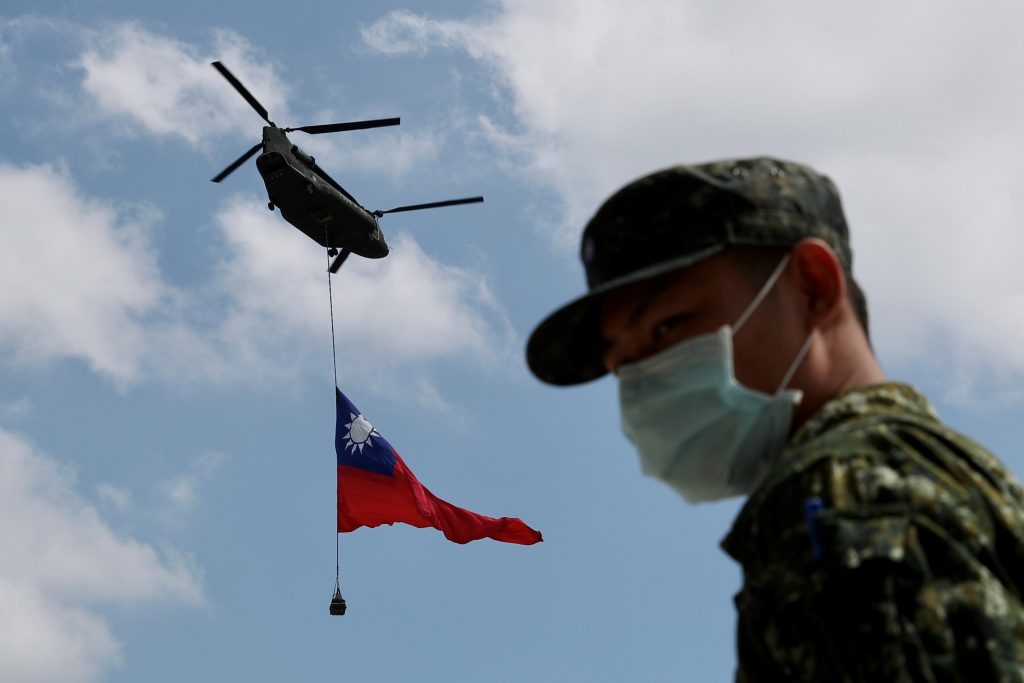This Monday, the Taiwanese government reported that the Chinese People’s Liberation Army (PLA) sent 56 warplanes to Taiwan’s air defense area, the largest ever number of military aircraft Beijing has sent to the island in a single day.
According to Reuters, Beijing has sent a total of almost 150 military planes to Taiwan’s defense zone since Friday, a major escalation in a place rife with geopolitical tensions.
According to the Taiwanese Defense Ministry, 52 of these military airplanes were sent together on Monday, with the PLA sending an additional 4 planes later that day. The Taiwanese government said that within the group of planes that were sent were 34 J-16 fighter jets and 12 H-6 strategic bombers, which have nuclear capability.
The Taipei government has condemned Beijing over these actions, saying that the Beijing government is the “chief culprit” on the recent rise in tensions between both parties. Taiwan’s Mainland Affairs Council saying that “the Republic of China on Taiwan (Taiwan’s official name) is determined to firmly defend national sovereignty and dignity and peace across the Taiwan Strait”.

The Foreign Minister of Taiwan, Joseph Wu, has warned China against launching an invasion, saying in an interview with Australia’s ABC that “if China is going to launch a war against Taiwan, we will fight to the end and that is our commitment”. The minister also said that the government of the island will continue to “engage in security or intelligence exchanges” with other partners so the island will be prepared for any possible threat against its security.
The U.S. State Department expressed its concerns over the growing tension in the Taiwan Straits yesterday, with Spokesman Ned Price issuing a press release where they urged China to “cease its military, diplomatic, and economic pressure and coercion against Taiwan” and accused the military maneuvers of the PLA as “destabilizing”. The State Department also reaffirmed that America’s commitment towards Taiwan was “rock solid”. Earlier this Monday, White House Press Secretary Jen Psaki said that the U.S is “also in touch privately, conveying clear messages through diplomatic channels” with Chinese officials
Beijing has doubled down on its combative rhetoric over the Taiwanese question, with their foreign ministry spokeswoman saying that “Taiwan belongs to China” and that Beijing has the “firm resolve and will to safeguard national sovereignty and territorial integrity”. China also lashed against the statement released by the State Department, saying that the remarks “seriously violate the one-China principle” and saying that Washington D.C should “stop supporting and emboldening separatist forces” calling for Taiwanese independence.

Rising tensions between China and Taiwan
The latest move by the Chinese government represents a high-mark in the growing tensions between Taipei and Beijing, but they are not new. Just in June of this year, the PLA sent 28 military airplanes to the Taiwanese area of defense, and in March the Taiwanese defense ministry also reported that Beijing had sent the largest number of warplanes near the island to that date.
The record military deployment of Chinese aircraft near Taiwan come a few weeks after the United States announced a nuclear submarine deal with Australia and the UK (AUKUS) which would allow Canberra to build eight nuclear-powered submarines (abandoning a previous submarine deal with France) with American technology as a way to confront the growing fears of Chinese expansion in the region, a move that angered Beijing while also opening a diplomatic rift with Paris.
Although the United States does not officially recognize the Taiwanese government as an independent country, Washington D.C. has sold billions of dollars’ worth in military equipment to the island, a point that has angered Beijing. Just in 2020, the United States sold $5 billion worth of military equipment to Taiwan, and President Biden announced in August that his administration is planning to sell an additional $750 million of military equipment to the island.

On September 24th, Biden also held the first-ever meeting in Washington D.C. with members of the “Quad” alliance (U.S., Australia, India, and Japan) who issued a statement confirming the group’s commitment to a “free and open Indo-Pacific”, with an emphasis on promoting a region that is “rules-based (…) and undaunted by coercion”. The forming of this alliance has been heavily criticized by China, which has called it a “closed, exclusive clique targeting other countries” which goes against the “aspiration of regional countries”.
Although the United States has made moves aimed at reassuring Taiwan, it is yet far from clear what position will the United States do in case of a Chinese attack to the island. With some questioning, if there is any political will in Washington D.C. to commit military resources to the defense of the Taipei government and with some even asking if the U.S. has the military capability of doing so.
This piece is syndicated with licensed permission from elamerican.com
"*" indicates required fields

